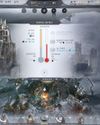
After years of pre-production, pitches, and prototypes, then 25 months of solid development, Glasgow-based developer No Code finally released sci-fi adventure Observation in May, 2019. I reviewed it for PC Gamer, calling it a “stylish, understated, and subtly chilling psychological thriller”, and other critics shared my enthusiasm for the game, which sees you playing as an artificial intelligence aboard a stricken space station.
That’s a long time to work on anything, and I’ve always wondered: What does releasing a game feel like? So I asked Observation’s writer/director Jon McKellan, founder of No Code and former UI designer on Alien: Isolation, about the immediate aftermath of releasing a new videogame to the world.
“We were so guarded during development because we didn’t want story spoilers getting out,” he says. “Then on release day you’re watching people playing it on Twitch and it feels wrong. You’ve kept this thing internal for so many years, and it’s been on your mind constantly, and suddenly it’s out in the wild. It’s a really bizarre feeling. The rules no longer apply.”
No Code makes weird games. Its debut, horror anthology Stories Untold, was a supremely strange puzzle game based around a series of archaic machines. Observation sees you operating a space station as its governing AI. Nevertheless, both games have sold enough to keep the studio open—and it has, in fact, recently moved to a larger building to accommodate more staff.
This story is from the December 2019 edition of PC Gamer US Edition.
Start your 7-day Magzter GOLD free trial to access thousands of curated premium stories, and 9,000+ magazines and newspapers.
Already a subscriber ? Sign In
This story is from the December 2019 edition of PC Gamer US Edition.
Start your 7-day Magzter GOLD free trial to access thousands of curated premium stories, and 9,000+ magazines and newspapers.
Already a subscriber? Sign In

"The War Within itself has kept me coming back most evenings too"
WORLD OF WARCRAFT remains my jailer, and I couldn't be more pleased about it

OK BUILDER
SATISFACTORY is the new titan in building and crafting games

HELL YES
DIABLO IV: VESSEL OF HATRED is a transformative expansion

MOUSE: PI FOR HIRE
This mouse wants to be more than just a gimmick

WINDBLOWN
Dead Cells dev's new roguelike has me afraid for my free time

NO MORE ROOM IN HELL 2
As the zombie horde surrounded me just moments after taking down my two remaining teammates, the writing was really on the wall. Armed with just a chef's knife, it was clear I stood no chance, but I was going down swinging, hoping for a miracle... it didn't come.

OWNED BY STEAM
VALVE cordially reminds you that your games aren't yours

CURSE OF THE AZURE BONDS
These classic games haven't aged badly, but I sure have.

DEEP FREEZE
Endure a blizzard of tough choices and rough consequences in FROSTPUNK 2

NEW HORIZONS
Building up REMNANT 2 outside the live service game grinder